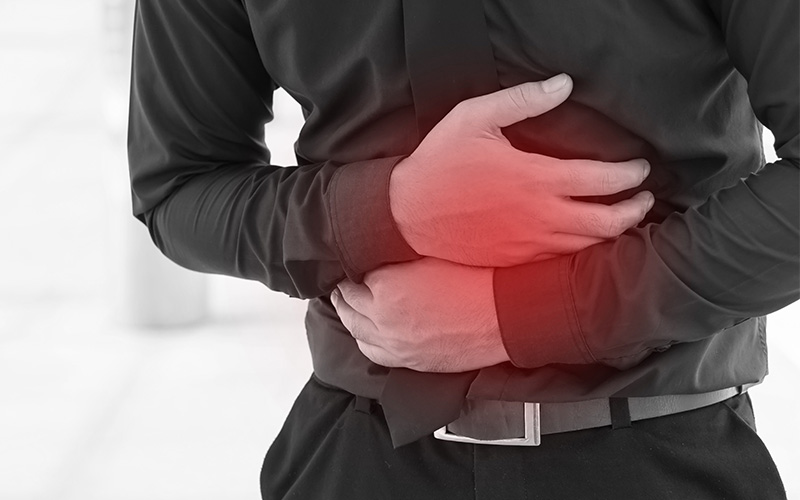
Changing lifestyles and food habits have heightened several medical complications in today’s population. One such prevalent disease is Gastroesophageal reflux disease (GERD) or acid reflux. It is a medical condition where acidified liquid from the stomach flows back into the esophagus. Although you might be already familiar with the symptoms because of its commonness, you shouldn’t be ignoring them. So, here’s a quick review of all the symptoms and what they mean.
Let’s look at some major symptoms of GERD.
Heartburn
The characteristic burning pain of acid reflux in the middle of the chest is called heartburn. Stimulation of nerve fibers in the esophagus due to the back-flowing acids causes this burning sensation. The pain, sometimes more pressure-like than burning, can start in the upper abdomen and extend up to the neck or even spread to the back. Sometimes, patients of GERD may wake up in their sleep due to heartburn.
Regurgitation
When the refluxed fluid reaches the mouth breaching the Upper Esophageal Sphincter (UES), it is called regurgitation. While small quantities of fluid only leave an acid taste in the mouth, in larger amounts, it can bring back food too. Long-term regurgitation leads to acid-induced teeth erosion.
Nausea or Vomiting
While nausea and vomiting are uncommon is some GERD patients, they are more prevalent in others compared to heartburn.
Other symptoms include:
Burping
Burping or belching is your body’s mechanism to pass out excess gas from the upper gastric tract. In most cases, it is caused by swallowing too much air while eating or drinking too quickly. An occasional burp or belch after a heavy meal is common and harmless. If however, you burp a lot, it might be a sign of gastroesophageal reflux as GERD escalates swallowing that result in increased belching.
Dysphagia
Dysphagia is the feeling of food being stuck inside your throat leading to struggles in swallowing. Chronic regurgitation of the acids from the stomach in case of GERD can cause throat irritation and lead to dysphagia. You may have difficulties in swallowing solid food or liquid or both. In severe cases, you may find it hard to swallow your saliva too.
Incessant Hiccups
Hiccups are the rapid and spontaneous contraction of the diaphragm muscles. Sometimes, babies with GERD are more prone to having hiccups.
Bloating
Bloating is a temporary sensation of the stomach swelling up. It occurs due to the production of excess gas in the intestine. It can make your tummy look larger, cause pain, uneasiness, and a ‘stuffed’ feeling. While it is commonly caused due to overeating or eating foods that you might be allergic to, chronic bloating can be a result of acid reflux.
Severe Soreness of Throat
Acid reflux can be associated with wheezing, hoarseness or chronic sore throat when the refluxed juices travel past the upper esophageal sphincter to enter the larynx (voice box) and pharynx (throat).
Bad Breath
Having bad breath is also known as halitosis. Bad oral hygiene and lifestyle habits like smoking lead to bad breath which can end up causing embarrassment or even anxiety. Due to regular reflux of gastric acids in GERD, bad breath might become an issue.
Weight Loss
Sometimes, acid reflux can lead to a loss of appetite and unexplained weight loss.
If you have acid reflux during the night, you may also experience the following symptoms:
Chronic Cough
When a cough lasts for almost eight weeks or longer than that, it is termed as chronic coughing. Although not a typical symptom of acid reflux, a considerable population of patients suffering from chronic cough owes it to GERD.
Disturbed Sleep
Nighttime GERD is one of the prime causes of sleep disruption in older people. Insomnia, daytime sleepiness, sleep apnea, and restless legs syndrome are aggravated by acid reflux.
Laryngitis
A voice disorder called reflux laryngitis results from the regular regurgitation of acids in GERD. It causes irritation and inflammation of vocal folds.
When Do the Symptoms Occur?
The symptoms of GERD occur mostly after a sumptuous meal or when you bend over or lay on your back after meals. Most people with GERD experience symptoms during nighttime. Also, increased pressure and hormones from the growing fetus in the womb of a pregnant woman produce reflux symptoms very often.
Being obese, smoking regularly or taking certain medications like analgesics, antidepressants, and antihistamines also increase chances of GERD symptoms. In infants too, repeated vomiting, respiratory problems, and coughing are signs of acid reflux.
If you are experiencing the above GERD symptoms frequently it is advisable that you seek medical care immediately. Your physician may recommend over-the-counter antacids, alginate drugs, PPIs, or H2 blockers depending on the severity of your condition. Simple lifestyle and dietary alterations can reduce the symptoms. In extreme cases or medication intolerant instances, you might even have to undergo surgery.
When you want to fight acid reflux symptoms, choose Gas-O-Fast and experience instant relief from them!
Disclaimer This blog solely intended for the educational/informational/awareness purposes and is not a substitute for any professional medical advice, diagnosis or treatment. Please consult your doctor/healthcare professional before acting on the information provided on the blog. Reliance on any or all information provided in the blog, is solely at your own risk and responsibility. Mankind Pharma Limited shall not be held liable, in any circumstance whatsoever.
Recent Posts
POPULAR CATEGORIES
POPULAR TAGS